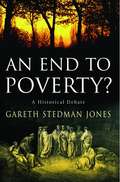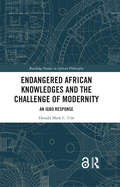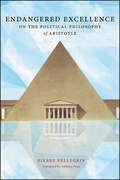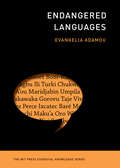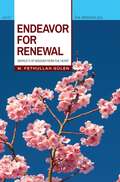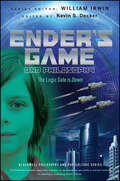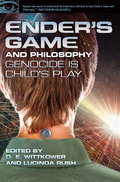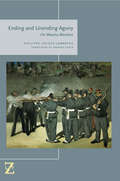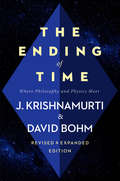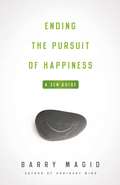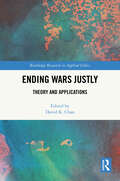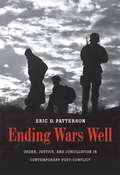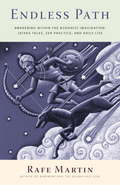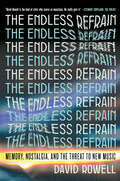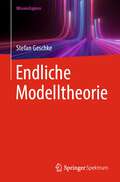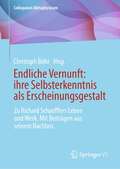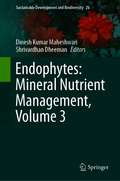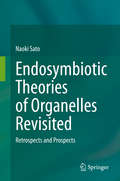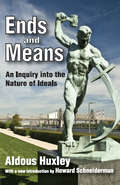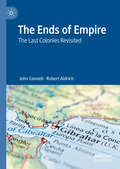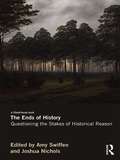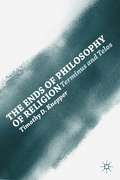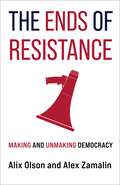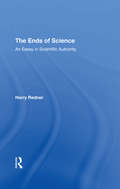- Table View
- List View
An End to Poverty?: A Historical Debate
by Gareth Stedman JonesIn the 1790s, for the first time, reformers proposed bringing poverty to an end. Inspired by scientific progress, the promise of an international economy, and the revolutions in France and the United States, political thinkers such as Thomas Paine and Antoine-Nicolas Condorcet argued that all citizens could be protected against the hazards of economic insecurity. In An End to Poverty? Gareth Stedman Jones revisits this founding moment in the history of social democracy and examines how it was derailed by conservative as well as leftist thinkers. By tracing the historical evolution of debates concerning poverty, Stedman Jones revives an important, but forgotten strain of progressive thought. He also demonstrates that current discussions about economic issues—downsizing, globalization, and financial regulation—were shaped by the ideological conflicts of the late eighteenth and early nineteenth centuries.Paine and Condorcet believed that republicanism combined with universal pensions, grants to support education, and other social programs could alleviate poverty. In tracing the inspiration for their beliefs, Stedman Jones locates an unlikely source-Adam Smith. Paine and Condorcet believed that Smith's vision of a dynamic commercial society laid the groundwork for creating economic security and a more equal society. But these early visions of social democracy were deemed too threatening to a Europe still reeling from the traumatic aftermath of the French Revolution and increasingly anxious about a changing global economy. Paine and Condorcet were demonized by Christian and conservative thinkers such as Burke and Malthus, who used Smith's ideas to support a harsher vision of society based on individualism and laissez-faire economics. Meanwhile, as the nineteenth century wore on, thinkers on the left developed more firmly anticapitalist views and criticized Paine and Condorcet for being too "bourgeois" in their thinking. Stedman Jones however, argues that contemporary social democracy should take up the mantle of these earlier thinkers, and he suggests that the elimination of poverty need not be a utopian dream but may once again be profitably made the subject of practical, political, and social-policy debates.
An End to Poverty? A Historical Debate
by Gareth Stedman JonesA renowned historian explores the history of arguments about poverty and globalization, and their relevance to contemporary political debates.
Endangered African Knowledges and the Challenge of Modernity: An Igbo Response (Routledge Studies in African Philosophy)
by Donald Mark UdeThis book presents an innovative African philosophical response to coloniality and the attendant epistemicide of Africa’s knowledge systems, drawing on Igbo thinking.This book argues that theorizing modernity requires a critical conversation between African and Western scholarship, in order to unpack its links with coloniality and the subjugation of Africa’s indigenous knowledges. In setting out this discussion, the book also connects with Latin American scholarship, demonstrating how the modern world is structured to marginalize and destroy knowledges from across the Global South. This book draws on Igbo epistemic resources of solidarity thinking, positioned in contrast to capitalist knowledge-patterns, thereby providing an important Africa-driven response to modernity and coloniality. This book concludes by arguing that the Igbo sense of solidarity is useful and relevant to modern contexts and thus constitutes a vital resource for a less disruptive, more balanced, and more wholesome modernity.At a time of considerable global crises, this book makes an important contribution to philosophy both within Africa and beyond.
Endangered Excellence: On the Political Philosophy of Aristotle (SUNY series in Ancient Greek Philosophy)
by Pierre PellegrinIn Endangered Excellence, Pierre Pellegrin provides a fresh interpretation of Aristotle's Politics, revealing the extent to which Aristotle diverged from other ancient writers on politics, and the extent to which many of his positions resemble modern attitudes in political philosophy. Pellegrin highlights a number of strikingly original positions in his thought. Aristotle took humans to be inherently political, for example, even as he believed this characteristic developed more completely in men than in women, and in Greeks more than in barbarians. He maintained a nuanced and flexible conception of the way that cities ought to develop their constitutions, one that would be responsive to their particular social and historical contexts. Realist enough to recognize that virtuous men are rare and that class conflict is inevitable, Aristotle envisioned a political system that would be resilient in navigating the choppy waters of civic life. With this original approach to Aristotle's Politics, and incorporating key developments in European and English-language scholarship on the subject, Pellegrin demonstrates Aristotle's important and often unrecognized innovations in understanding political life.
Endangered Languages: Insights From Endangered Languages (The MIT Press Essential Knowledge series #12)
by Evangelia AdamouA concise, accessible introduction to language endangerment and why it is one of the most urgent challenges of our times.58% of the world’s languages—or, approximately 4,000 languages—are endangered. When we break this figure down, we realize that roughly ten percent of languages have fewer than ten language keepers. And, if one language stops being used every three months, this means that in the next 100 years, if we do nothing, 400 more languages will become dormant. In Endangered Languages, Evangelia Adamou, a specialist of endangered languages and a learner of her own community language, Nashta, offers a sobering look at language endangerment and what is truly lost when a language disappears from usage.Combining recent advances from the Western scientific tradition—from the fields of linguistics, psycholinguistics, neurolinguistics, language attrition, population genetics, and natural language processing—and insights from Indigenous epistemology, theory, and ethics, Adamou examines a wealth of issues surrounding endangered languages. She discusses where endangered languages are found, including how they are faring in a digital world, why these languages are no longer used, and how communities can reclaim languages and keep them strong. Adamou also explains the impact of language continuity on community and individual health and well-being, the importance of language transmission in cultural transmission, and why language rights are essentially human rights.Drawing on varied examples from the Wampanoag Nation to Wales, Endangered Languages offers a powerful reminder of the crucial role every language has in the vitality and well-being of individuals, communities, and our world.
Endeavor for Renewal
by M. Fethullah GulenTrue renewal is realized by retaining the purity of the seed and the root, and by synthesizing an entire inheritance of values with new thoughts and wisdom appropriate to the age. A thorough revival can only be realized with the efforts of the spirit, intellect, feelings, and willpower working in concert. Utilizing the spirit&’s power to the fullest, making flawless use of the knowledge inherited from the past, being constantly open to spiritual breezes of inspiration, not being trapped by blind imitation, and always following a sound methodology are some dynamics of an ideal renewal.The vigorous souls with steel willpower must keep running on the path of serving humanity with an insatiable love for research, an ever-evolving passion for knowledge of God, and an otherworldly profundity beyond comprehension. This book conveys the feelings and thoughts of a person who has dedicated his life for the coming of such a generation and who suffers, in heart and mind, for this noble ideal.
Ender's Game and Philosophy
by Kevin S. Decker William IrwinA threat to humanity portending the end of our species lurks in the cold recesses of space. Our only hope is an eleven-year-old boy.Celebrating the long-awaited release of the movie adaptation of Orson Scott Card's novel about highly trained child geniuses fighting a race of invading aliens, this collection of original essays probes key philosophical questions raised in the narrative, including the ethics of child soldiers, politics on the internet, and the morality of war and genocide.Original essays dissect the diverse philosophical questions raised in Card's best-selling sci-fi classic, winner of the Nebula and Hugo Awards and which has been translated in 29 languagesPublication coincides with planned release of major motion picture adaptation of Ender's Game starring Asa Butterfield and Harrison FordTreats a wealth of core contemporary issues in morality and ethics, including child soldiers, the best kind of education and the use and misuse of global communications for political purposesA stand-out addition to the Blackwell Philosophy and Pop Culture series
Ender's Game and Philosophy
by D. E. Wittkower Lucinda RushEnder's Game, Orson Scott Card's award-winning 1985 novel, has been discovered and rediscovered by generations of science fiction fans and young adult readers, banned and challenged in schools, assigned in high school English classes, and adopted as reading by the US Marine Corps. Ender's Game and its sequels explores rich themes-the violence and cruelty of children, the role of empathy in war, and the balance of individual dignity and the social good-with compelling elements of a coming-of-age story and exciting and immersive battle scenes.Ender's Game and Philosophy brings together over thirty philosophers to engage in wide-ranging discussion on the troubling, exciting, and fascinating issues raised in and amidst the excitement and fear of Orson Scott Card's novels and Gavin Hood's film.Authors address issues such as:the justifiability of pre-emptive strikes, how Ender's disconnected and dispassionate violence is mirrored in today's drone warfare, whether the end of saving the species can justify the most brutal means, the justifiability of lies and deception in wartimes, how military schools produce training in virtue, how Ender as the "good student" is held to a different educational standard, which rules can be broken in games and which cannot, Ender's world as a mirror of our own surveillance society, the moral hazards of child warriors, the value of Ender's ability to sympathize with his enemies, the meaning of a "hive-mind," the limits of our ability to relate to one, the relationship between Ender's story and Card's Mormonism.The authors of Ender's Game and Philosophy challenge readers to confront and work through the conceptual and emotional challenges that Ender's Game presents, bringing a new light on the idea of a just war, the virtues of the soldier, the nature of childhood, the social value and moral corruption of lies and deception, the practices of education and of leadership, and the serious work of playing games.
Ending and Unending Agony: On Maurice Blanchot (Lit Z)
by Philippe Lacoue-LabarthePublished posthumously, Ending and Unending Agony is Philippe Lacoue-Labarthe’s only book entirely devoted to the French writer and essayist Maurice Blanchot (1907–2003). The place of Blanchot in Lacoue-Labarthe’s thought was both discreet and profound, involving difficult, agonizing questions about the status of literature, with vast political and ethical stakes.Together with Plato, Holderlin, Nietzsche, Benjamin, and Heidegger, Blanchot represents a decisive crossroads for Lacoue-Labarthe’s central concerns. In this book, they converge on the question of literature, and in particular of literature as the question of myth—in this instance, the myth of the writer born of the autobiographical experience of death.However, the issues at stake in this encounter are not merely autobiographical; they entail a relentless struggle with processes of figuration and mythicization inherited from the age-old concept of mimesis that permeates Western literature and culture. As this volume demonstrates, the originality of Blanchot’s thought lies in its problematic but obstinate deconstruction of precisely such processes.In addition to offering unique, challenging readings of Blanchot’s writings, setting them among those of Montaigne, Rousseau, Freud, Winnicott, Artaud, Bataille, Lacan, Malraux, Leclaire, Derrida, and others, this book offers fresh insights into two crucial twentieth-century thinkers and a new perspective on contemporary debates in European thought, criticism, and aesthetics.
The Ending of Time
by Jiddu KrishnamurtiSpirituality meets science as two of the greatest minds of our time come together to discuss essential issues of good and evil, thought and consciousness, and the nature of existence.The Ending of Time presents the fascinating conversations between two men from vastly different worlds: revered philosopher Jiddu Krishnamurti and renowned physicist David Bohm. Through deep exploration of the brain vs. the mind, the significance of death, and an individual's relationship to society, they debate the root of human conflict and what we can do about it. Revolutionary insights throughout these discussions reveal the potential for the ending of time to bring about a new beginning for humanity. wrong turn humanity has taken--a state that they argue can be corrected. Though they insist that mankind can change fundamentally, they warn that transformation requires going from one's narrow and particular interests toward the general, and ultimately moving still deeper into that purity of compassion, love and intelligence that originates beyond thought, time, and even emptiness.This updated edition, edited and revised in clear and engaging language, includes a new introduction and a conversation previously published separately which examines "The Future of Humanity."
Ending the Pursuit of Happiness
by Barry MagidWe all have a right to the pursuit of happiness - but could we actually be happier if we gave that whole thing up? This surprising new book from Zen teacher, psychoanalyst, and critical favorite Barry Magid inspires us - in gentle and winking prose - to move on and make peace with the perfection of the way things actually are, including ourselves. Magid invites us to consider that our "pursuit of happiness" may actually be a source of our suffering. He takes an unusual look at our "secret practices" - what we're really doing when we say we're meditating-like trying to feel calmer, or more compassionate, or even "enlightened" (whatever we imagine that means!). He also uncovers our "curative fantasies" about spiritual practice - those ideas that we can somehow fix all the messy human things about ourselves that we imagine are bad or wrong or unacceptable. In doing so, he helps us look squarely at-and avoid-such pitfalls. Along the way, Magid lays out a rich roadmap of the new "psychological-minded Zen" - a Zen that includes our entire life, our entire personality - as pioneered by his teacher, bestselling author Charlotte Joko Beck.
Ending Wars Justly: Theory and Applications (Routledge Research in Applied Ethics)
by David K. ChanThis volume features original essays on the ethics of ending wars (jus ex bello). It fills a significant gap in just war theory and sets the stage for other thinkers to engage with the topic.What makes questions about jus ex bello especially difficult for ethicists to answer is that the just war tradition has neglected to develop principles for ending wars justly. Until recently, debates have primarily focused on justice in going to war (jus ad bellum), justice in fighting a war (jus in bello), and justice after war (jus post bellum). Additionally, many contemporary conflicts are unconventional and not the kind that the traditional principles of just war theory are designed to address. The chapters in this volume address the question of how and when wars can end justly. Part 1 approaches jus ex bello from different theoretical angles, including just war theory, virtue ethics, pacifism, and feminism. Part 2 discusses specific aspects of recent wars: the United States' withdrawal from Afghanistan after 20 years of military involvement in the country, and the war that began with the Russian invasion of Ukraine in 2022, that is so difficult to end despite the escalating human cost.Ending Wars Justly is an essential resource for scholars and advanced students working in just war theory, the ethics of war and peace, international relations, and military and strategic studies.
Ending Wars Well
by Eric D. PattersonThough scholars of political science and moral philosophy have long analyzed the justifications for and against waging war as well as the ethics of warfare itself, the problem ofendingwars has received less attention. In the first book to apply just war theory to this phase of conflict, Eric Patterson presents a three-part view of justice in end-of-war settings involving order, justice, and reconciliation. Patterson’s case studies range from successful applications ofjus post bellum,such as the U. S. Civil War or Kosovo, to challenges such as present-day Iraq.
Endless Path
by Richard Wehrman Rafe MartinThe jataka tales--stories of the Buddha's past lives (in both human and animal form)--were first said to have been told by the Buddha himself 2,500 years ago. Five hundred and fifty jataka tales comprise part of the oldest Buddhist text, the Pali Canon. From this wealth of folklore, award-winning author and storyteller Rafe Martin has chosen ten tales that illustrate the ideals of the Buddhist paramitas, or "perfections" of character: giving, morality, forbearance, vitality, focused meditation, wisdom, compassionate skillful means, resolve, strength, and knowledge. Artist and designer Richard Wehrman helps bring the spirit of these stories alive with rich illustrations that open each chapter.Endless Path presents these ancient stories, usually reduced to children's tales in the West, for adults, reconnecting modern seekers with the more imaginative roots of Buddhism. The jatakas help readers see their own lives, their failures and renewed efforts, in the same light as the challenges the Buddha faced--not as obstacles but as opportunities for developing character and self-understanding. Endless Path demonstrates the relevance of these tales to Buddhist lay practitioners today, as well as to those more broadly interested in Buddhist teaching and the ancient art of storytelling.From the Trade Paperback edition.
The Endless Refrain: Memory, Nostalgia, and the Threat to New Music
by David RowellA veteran music journalist argues that the rise of music streaming and the consolidation of digital platforms is decimating the musical landscape, with dire consequences for the future of our culture …In The Endless Refrain, former Washington Post writer and editor David Rowell lays out how commercial and cultural forces have laid waste to the cultural ecosystems that have produced decades of great American music. From the scorched-earth demonetizing of artist revenue accomplished by Spotify and its ilk to the rise of dead artists &“touring&” via hologram, Rowell examines how a perfect storm of conditions have drained our shared musical landscape of vitality.Combining personal memoir, intimate on-the-ground reporting, industry research, and cultural criticism, Rowell&’s book is a powerful indictment of a music culture gone awry, driven by conformity and subverted by the ways the internet and media influence what we listen to and how we listen to it.
Endliche Modelltheorie
by Stefan GeschkeDieses Buch basiert auf dem Skript zu einer Vorlesung über endliche Modelltheorie an der Freien Universität Berlin und dient als eine kurze Einführung in das Thema. Vorausgesetzt wird dabei eine gewisse Vertrautheit mit mathematischer Notation und grundlegenden Konzepten, wie zum Beispiel Mengen, die man in einer einführenden Mathematikvorlesung für Studierende der Mathematik, Informatik oder der Naturwissenschaften erwirbt. Ausdrücklich nicht vorausgesetzt werden Kenntnisse in mathematischer Logik.Die Produktfamilie WissensExpress bietet Ihnen Lehr- und Lernbücher in kompakter Form. Die Bücher liefern schnell und verständlich fundiertes Wissen.
Endliche Vernunft: Zu Richard Schaefflers Leben und Werk. Mit Beiträgen aus seinem Nachlass (Colloquium Metaphysicum)
by Christoph BöhrDrei wichtige Manuskripte aus dem Nachlass von Richard Schaeffler – er lebte von 1926 bis 2019 – versammelt dieses Buch, ergänzt um eine Reflexion zur Theodizee und vier Beiträgen des Herausgebers über Leben und Werk des bedeutenden Philosophen. Die bisher unbekannten, autobiographisch geprägten Texte Schaefflers, die er kurz vor seinem Tod dem Herausgeber für eine spätere Veröffentlichung überließ, erscheinen hier erstmals. Bei näherem Hinsehen zeigt sich, dass Denken und Leben bei Schaeffler zu einer Einheit verschmelzen: Durch Lebenserfahrung angestoßen, eröffnet uns das Denken die Möglichkeit einer Versöhnung mit der eigenen Lebensgeschichte. Das gilt in besonderer Weise für die Erfahrung von Leid, die Schaefflers Leben vor allem in der Jugend – als Halbjude in der Zeit des Nationalsozialismus – und im Alter – angesichts von Krankheit und Siechtum – prägte. Wie kann Philosophie mit Leiden und Endlichkeit umgehen, ohne der Verzweiflung zu verfallen? Dem Leser gibt Schaeffler Zeugnis von seiner Selbstverständigung als Wissenschaftler: dass nämlich Philosophie nur dort ihren Namen verdient, wo sie nicht in der weltentrückten Beschaulichkeit eines Gelehrtenzimmers betrieben wird, sondern – als Lebensform eingeübt und erprobt – ihren Ausgang nimmt in den eigenen (Leid-) Erfahrungen – der Erfahrung bedrängender menschlicher Endlichkeit. Das Leben ist der Prüfstein des Denkens.
Endophytes: Mineral Nutrient Management, Volume 3 (Sustainable Development and Biodiversity #26)
by Dinesh Kumar Maheshwari Shrivardhan DheemanThe challenges to meet the food requirement of the burgeoning population and stabilized productivity of agriculture lands can only be met by a second green revolution. After steadily declining for over a decade hunger is on the rise again, affecting million people of the global population. Therefore, crop yields must be increased substantially over the coming decades to keep pace with global food demand. The plant rhizosphere is a multidimensional and dynamic ecological environment of complicated microbe–plant interactions for harnessing essential macro and micronutrients from a limited nutrient pool. This book will showcase naturally-occurring endophyte which can be explored for nutrient mineralization and mobilization for sustainable agriculture. This will cover recent trends, prospects, critical commentaries and advancement in the research area focusing on naturally-occurring beneficial endophytic microbes. Thus, it is proposed to bring out new scientific insights and frontiers of research that have exploration of endophyte for mineral nutrient management in soil and crops. The chapters are contributed by leading scientists across the globe. The book will be useful to agronomists, microbiologists, ecologists, plant pathologists, molecular biologists, environmentalists, policy makers, conservationists, and NGOs working for the crop production and productivity development and consequently over all agricultural significance.
Endosymbiotic Theories of Organelles Revisited: Retrospects and Prospects
by Naoki SatoThis book re-examines the endosymbiotic theory, and presents various related theories and hypotheses since the first proposal in 1905 by a Russian biologist. It also demonstrates that Lynn Margulis’s contribution to the current endosymbiotic is less than sometimes thought, and presents a plausible idea on how the organelles were formed. Explaining that Margulis’s initial work did not intend to show the endosymbiotic origin of chloroplasts and mitochondria, the book discusses their endosymbiotic origin in the light of current biology with the help of clear visual images. Further, by including numerous historical facts and details of phylogenetic analyses using recent genomic data that are largely unknown to many in the field, it offers deep insights into the history of biology, phylogenetic analysis, and the new evolutionary thinking. 2017 was the 50-year anniversary of Margulis’s first paper in the Journal of Theoretical Biology, and 2020 will mark 50 years since the publication her famous work Origin of Eukaryotic Cells, and as such this book offers a timely reconsideration ofthe works of Lynn Margulis and the endosymbiotic origin of organelles.
Ends and Means: An Inquiry into the Nature of Ideals
by Aldous HuxleyContemporary intellectuals still struggle over the relationship of ends to means, especially in political discourse. Pacifism is still an important topic today, as terrorism and dictatorial states abound. Many will find solace in Ends and Means, while others will find the book only a case study of the relationship of ethics to politics.Aldous Huxley examines common issues in a unique fashion. How can the regression in charity through which we are living, and for which each one of us is in some measure responsible, be halted and reversed? How can existing society be transformed into the ideal society described by the prophets? How can the average sensual man and the exceptional (and more dangerous) ambitious man be transformed into a non-attached being, one who can create a society significantly better than our own?Huxley discusses the relationship between the theories and the practices of reformers and the nature of the universe. He argues that our beliefs about the ultimate nature of reality help us formulate conceptions of right and wrong, not only in our private life, but also in the sphere of politics and economics. Far from being irrelevant, our philosophical beliefs are the final determining factor in our actions. This provocative classic volume, now available in paperback, will continue to stimulate discussion and thought.
The Ends of Empire: The Last Colonies Revisited
by John Connell Robert AldrichThis book offers a fresh analysis of constitutional, economic, demographic and cultural developments in the overseas territories of Britain, France, the Netherlands, Denmark, Spain, the United States, Australia and New Zealand. Ranging from Greenland to Gibraltar, the Falklands to the Faroes, and encompassing islands in the Atlantic, Pacific and Indian Oceans, and the Caribbean, these territories command attention because of their unique status, and for the ways that they occasionally become flashpoints for rival international claims, dubious financial activities, illegal migration and clashes between metropolitan and local mores. Connell and Aldrich argue that a negotiated dependency brings greater benefits to these territories than might independence.
The Ends of History: Questioning the Stakes of Historical Reason (Laurier Studies In Political Philosophy Ser. #1)
by Amy Swiffen Joshua NicholsThe Ends of History? considers how, despite the fact that events in the past 20 years have called Francis Fukuyama’s infamous announcement of the end of history into question, the issue of the end of history is now a matter of renewed interest and debate. Two decades ago we were confronted by the end of the Soviet Union and collapse of the geo-political divisions that had defined much of the twentieth century. From this particular end, the ‘end of history’ was proclaimed. But is it still possible to argue that liberal democracy and free market capitalism are the final form of law and mode of production in human history? Recent events have called this thesis into question: from 9/11 and the War on Terror, to the current global economic collapse and looming ecological crises, it seems that history if far from over. And yet, oddly enough, the question of ‘the end’ has returned. For example, in the often predicted, but still uncertain, establishment of either a new international American Empire or a new era of International Law, and the global resurgence of religion as a dominant source of political identification. On the other hand, perhaps the ‘end’ is still yet to come, slowly accumulating, mustering at the periphery of the geo-political landscape and outside the productive sphere. Responses taking up these questions range from a return to Universalism, political theology, Messianism, and even the old specter of communism. This volume assesses these responses, exploring what is at stake in proclaiming ‘the end’ in the current historical moment. Is it a matter of reading the writing on the wall? Or is the proclamation itself a political act? Furthermore is there a desire for the ‘end’? In addressing these questions, the contributors to The Ends of History? confront the various ‘ends’ that we now live, and in so doing they open new lines of sight into the future.
The Ends of Philosophy of Religion, Terminus and Telos
by Timothy D. KnepperKnepper criticizes existing efforts in the philosophy of religion for being out of step with, and therefore useless to, the academic study of religion, then forwards a new program for philosophy of religion that is in step with, and therefore useful to, the academic study of religion.
The Ends of Resistance: Making and Unmaking Democracy
by Alix Olson Alex ZamalinSince the rise of Donald Trump and other right-wing authoritarians worldwide, we have been told to “resist.” But this kind of opposition looks surprisingly like restoring the status quo. Under the banner of resistance, liberals and progressives have encouraged voting for Democrats, reading the mainstream media, trusting the science, putting up yard signs, buying the right products, and celebrating a “return to normal.” How was “resistance” diluted, and where can we find alternative forms of resistance for present and future struggles?Alix Olson and Alex Zamalin offer a clear-eyed critical account of how neoliberalism has redefined resistance to thwart social movements and consolidate power. Elites have domesticated and coopted some once-radical concepts and practices into “restorative resistance” that bolsters support for an unjust social order while marginalizing, racializing, and criminalizing many others. Olson and Zamalin argue that true resistance to racial neoliberalism must instead be deeply antirestorative: collective, horizontal, counterhegemonic, radically democratic insurrectionary movements that cannot be redirected into shoring up the existing order. This “unruly world-building”—exemplified by Occupy Wall Street, the Movement for Black Lives, Indigenous activism at Standing Rock, and more—pushes us to live, think, and dream beyond profit maximization, democratic civility, and individual freedom. Powerfully and accessibly written with manifesto-like urgency, The Ends of Resistance shows how marginalized voices and social movements deepen our thinking for confronting power.
The Ends Of Science: An Essay In Scientific Authority
by Harry RednerIn this path-breaking and controversial book, Harry Redner provides a systematic study of how the epistemologically interesting features of contemporary science are to be understood. Taking “science†to include knowledge from the social sciences and humanities as well as the physical sciences, Redner shows how the history of science, philosophical theory, and current scientific research reveal connections between scientific developments and features of the social organization of science. Redner argues that the shift from Classical science to a more complex and less orderly World science after World War II has changed the way scientific research is done and how its knowledge is organized. His aim, however, “is not merely to interpret science, but to change it.†Thus, this examination is more than a survey and critique—it is a positive program for the development of future science. Remarkable for its breadth and insight, the book is especially valuable for its discussions of authority and social organization (with the accompanying themes of academic politics, competition, power, and corruption) and for its catalog of the various contemporary critiques of science. Some of these are European in origin and will be new to many U.S. readers. A tour de force on several levels, this book is essential reading for scientists, philosophers, sociologists of science, historians of ideas, critics of contemporary culture and, indeed, for anyone who takes a serious interest in scientific research and higher learning.
